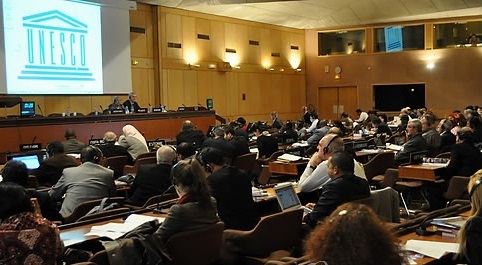The five counties of South Korea's eastern Gangwon Province plan to restart their efforts to be put on the list of UNESCO Biosphere Reserves this year, a provincial government official said Monday.
The five counties are Cherwon, Hwacheon, Yanggu, Inje and Goseong, all located near the Demilitarized Zone, bisecting the two Koreas, and in a mountainous region, the official said.
The attempt is the second of its kind, following one in 2012.

This file photo shows the MAB International Co-ordinating Council adopting a report on the periodic review of South Korea's UNESCO-designated biosphere reserve Jeju Island during its 25th session at the UNESCO headquarters in Paris on May 28, 2013. (Yonhap)
At that time, the environment ministry unsuccessfully tried to seek the BR status for Gangwon and Gyeonggi provincial counties and the DMZ because of tense inter-Korean relations and some local residents' opposition.
"But this time, we've decided to apply only the Gangwon counties for the UNESCO status at a provincial level, while excluding Gyeonggi counties and the DMZ," the official said,
The DMZ will also be sought for the registration on the BR list at a national level later when inter-Korean relations will be improved, the official said.
The provincial government plans to hold meetings with local residents for their better understanding of its plan in the first half of this year and draw up a preliminary application by the end of the year, according to the official.
The province will endeavor to complete procedures for on-site UNESCO inspections and the submission of a final application next year, the official said.
The final decision on whether to put the counties on the BR list will be made at a meeting of the Man and the Biosphere Programme International Co-ordinating Council between May and July 2019, according to the official.
Launched in 1971, the MAB develops the basis within the natural and social sciences for the rational and sustainable use and conservation of the resources of the biosphere and for the improvement of the overall relationship between people and their environment.
At present, 669 sites in 120 countries have been designated as Biosphere Reserves, with South Korea holding five, including Mount Seorak and Jeju Island. (Yonhap)

![[AtoZ into Korean mind] Humor in Korea: Navigating the line between what's funny and not](http://res.heraldm.com/phpwas/restmb_idxmake.php?idx=645&simg=/content/image/2024/04/22/20240422050642_0.jpg&u=)
![[Exclusive] Korean military set to ban iPhones over 'security' concerns](http://res.heraldm.com/phpwas/restmb_idxmake.php?idx=645&simg=/content/image/2024/04/23/20240423050599_0.jpg&u=20240423183955)



![[Graphic News] 77% of young Koreans still financially dependent](http://res.heraldm.com/phpwas/restmb_idxmake.php?idx=645&simg=/content/image/2024/04/22/20240422050762_0.gif&u=)